

 |
|||
| Home | Interviews | Pressekonferenz mit Ian Paice, 23.02.2007, Wilnsdorf | ||||
| "If a rock'n'roll
band still exists five years after the beginning, that's a
miracle. Ten years, it's a double miracle. But forty years is
something you can't rationalize."
Pressekonferenz mit Ian Paice vor dem Konzert mit Demon's Eye, 23.02.2007, Wilnsdorf |
||||
|
abgetippt und übersetzt von Lars Wehmeyer Vor dem Konzert mit der Deep Purple Tribute Band Demon's Eye stellte
sich Ian Paice am 23.02.2007 in Wilnsdorf den örtlichen Pressevertretern.
Natürlich hatte auch der Aviator-Fanclub einen Vertreter zu
diesem Medienereignis geschickt. Wie Andree Schneider bereits an anderer Stelle beschrieben hat, bestand meine Aufgabe
u.a. darin, Ian Paice nach seinem "One Handed Roll" zu fragen, damit
er ihn während der Pressekonferenz direkt vorführen kann. Werner Büdenbender: Meine Damen und Herren, ich begrüße Sie herzlich hier in den heiligen Hallen im Ratssaal der Gemeinde Wilnsdorf. Es ist ein sehr außergewöhnlicher Anlass heute, ich glaube, so etwas hat in diesem Ratssaal noch nicht stattgefunden. Gestatten Sie mir, dass ich zuerst unseren heutigen Ehrengast begrüße. Ich habe mir ein paar Zeilen auf Englisch zusammengeschrieben - ich hoffe, dass ich das so rüberbringen kann, dass zumindest Mr. Paice das verstehen kann. (Ian Paice stöhnt und winkt ab - Gelächter)
In the last few days I read two things about you in a paper. The
first statement was "Without a doubt, Ian Paice has secured his
place in the drummers' hall of fame". And the second was "Ian
Paice is one of the icons of hard rock". I think that both
statements have hit the nail on the head. Mr. Paice, I hope that
you have a good time in Wilnsdorf. We are looking forward to a
great rock concert with the drum legend Ian Paice and the band
Demon's Eye, a band which has its roots in our town of Wilnsdorf,
and is called the best Deep Purple Tribute Band in Europe. Thank
you so much for your attention. Ian Paice: Thank you very much. Werner Büdenbender: May I now ask you to be so kind as to sign the visitors' book of Wilnsdorf? Ian Paice: Certainly.
(Unterschrift - Fotos - Blitzlichtgewitter) Andree Schneider: Schönen guten Abend - wer möchte denn loslegen? Dirk Manderbach von der Siegener Zeitung: Herr Schneider, hätten Sie sich das jemals träumen lassen, dass einmal Ian Paice hier in Wilnsdorf am Schlagzeug sitzen würde? Georg Mark von der Westfälischen Rundschau in Siegen: Wie war der erste Auftritt in Holland?
Ian Paice: When I get the chance to
play with other musicians and I don't know them, I take a
chance. If they're good, it makes my job very easy. If they're not
so good, it makes my job very difficult. With Demon's Eye, it's
incredibly easy. Tim Plachner vom Siegerlandkurier: Mich würde interessieren, ob Mr. Paice auch schon mit anderen Deep Purple Coverbands oder Tribute Bands gespielt hat. Helmut Blecher, Westfalenpost: Ian, was ist der Unterschied zwischen großen Hallen und einem kleinen Auftrittsort wie heute abend?
Lars Wehmeyer vom deutschen Deep Purple Fanclub "The Aviator": Ian, what does it feel like to be playing the Deep Purple songs with a different band? You've been a founding member of Deep Purple, and you've been with Deep Purple for most of your life, since '68, so I wonder what it feels like. You've created all these songs with the different incarnations of Deep Purple, and now you're on stage playing them with a completely different band. What does that feel like? Ian Paice: The nice thing about Demon's Eye is they don't play all the obvious Deep Purple tunes. We play things from the Mark III lineup which is with Coverdale and Hughes, which are songs which I haven't played since 1976, and we play a couple of songs from the Mark I lineup, which I haven't played since 1969. That's why I said any mistakes you hear will be my mistakes because these guys learn from the record, and that's their piece of reality for the music. I probably haven't listened to those records in 25, 30 years. What is their reality, for me is maybe ten minutes in the studio. If you try to remember 10 minutes of your life from 25 years ago, I think you'll find it very difficult. They're playing different pieces of Deep Purple which, yes, I was instrumental in creating. That's great, because I would never get a chance to play those pieces of music ever again because they're not part of the Deep Purple that exists now. Just two or three songs we'll put in that are the classic big ones, but it's not just that. So it is different - it's not a matter of being on stage with a different band, I'm actually playing different music. It's not even in my consciousness that it's a different band, the whole thing is different, you know. Jörg Schulz, Heavy Magazine, Deutschland: I'd like to ask you: I know that Demon's Eye did write a song in the style of Deep Purple. Could you imagine playing a song of them together with them? Ian Paice: If they have a song they want to play, I'm quite happy to play anything. As I said, this is their show, I'm the guest. Ok, I have the big name, but I'm the guest of their show. Whatever they want to play is ok by me. They choose the songs, not me. They're the boss. I'm the blue collar guy. I'm happy just to be here and to be a part of it, and if they find something different for me to play, then that's great. It gives me something else to think about, it gives me another thing to try and create something. Drumming isn't just about keeping time. That's the difference between being a drummer and being a musician. If you're just going to keep time, you'd be a drummer, that's ok. But if you're going to create a piece of music within the music, then that's being a musician, that's being complete. So when I get something new to play, I have to start thinking first to make it better, if I can. Dirk Manderbach von der Siegener Zeitung nochmal: Eine Frage an Herrn Paice: Hatten Sie heute vielleicht Gelegenheit neben den Vorbereitungen für das Konzert etwas von der Gemeinde, etwas von dem Ort zu sehen? Die Landschaft zum Beispiel? Oder ist Ihnen irgendwas aufgefallen? Hat Ihnen irgendwas besonders gut gefallen?
(schaut an die Decke - Gelächter) There is one thing I want to say. There are very very few bands from my generation that still exist. Purple is obviously one, The Rolling Stones is another, The Who, to a certain extent, still exist, Pink Floyd when they want to, but that's about it from the generation from the 60s which created all this fabulous new music which people still enjoy today. And it's really important for a kid who has never been to a rock'n'roll show for somebody to take them along. Either the mother or father, or the big brother, say to this fifteen year old kid: "You're gonna see this!". Because when it's gone, when we finish, it's gone forever, and the music will never be so good again. Not to make too fine a point, but we are very precious, because we represent the last possibility to see the classic rock'n'roll that came out of the 60s. So if you do have young brothers, sisters, kids, and all they want to do is watch MTV, just tie them up and take them to a classic rock show, and they will never be the same kids again.
(Applaus) When we're gone, we're gone forever. Lars Wehmeyer: Since you will be the special guest of Demon's Eye tonight, and you play the drums, I guess there will be some time for a nice little drum solo. I would like to know whether you will be showing your famous "one handed roll" on the snare drum tonight. Ian Paice: Yes, there will be a drum solo, of course. I get more chance to play a drum solo outside of Deep Purple than I do in Deep Purple, the reason being there is only so much time at the venue when you are with two other acts. When Deep Purple play, the idea is to play as many songs as we can in the one hour fifty, two hours that we have. And sometimes a drum solo just isn't that important on the order of playing music. So yes, there will be a drum solo tonight, and yes, I will probably be showing you the one-handed roll. If you're very good and you pay me five Euros. (Gelächter) I'm cheap, I'm really cheap. Andree Schneider: Dazu möchte ich noch etwas sagen: Ich habe mir ja schon fast gedacht, dass die Frage nach dem "One Handed Roll" kommt, und für mich ist das eigentlich unbegreiflich, wie man einen Wirbel mit nur einer Hand hinkriegen kann. Und weil ich schon geahnt habe, dass die Frage kommt, habe ich eine Snaredrum mitgebracht, und ich würde auch 5 Euro bezahlen, wenn Du uns den Wirbel mal zeigen würdest.
Ian Paice: It just so
happens.... (zieht Drumsticks aus der Tasche) I always
carry a pair of those. (Ian zeigt den One Handed Roll) Ein Journalist: Ist das ein Trick? Ian Paice: Trick is not the right word. But it's about knowledge. It's about knowing how your instrument works. It's about having the technique to keep the stick in exactly the right place with no movement, and you have to understand the laws of physics to make it work. And you need to have really really strong finger muscles. If you do all those three things, then you can do this thing. Jörg Schulz: Could you imagine next year, with 40 years Deep Purple, for example to invite younger people who are playing Purple songs or even inviting the former members of the band? What will happen next year in Deep Purple? Ian Paice: You know, when you're at this stage of your career as Deep Purple are - if a rock'n'roll band still exists five years after the beginning, that's a miracle. Ten years, it's a double miracle. But forty years is something you can't rationalize, you can't give a logical reason why we're still here. So I can't tell you in one year what will be happening at all. If everyhing is the way we want it, then Deep Purple will still be here, and the audiences will still be having a great time, but you can never tell. One year is a long time. I don't see any changes, I believe we will still be here for the next few years, doing what we do. Anniversaries are something other people talk about. We don't think about the 40th anniversary, we didn't think about the 30th anniversary. There's so many rumours of old members coming back into the band, but it's nothing to do with us. We have a situation where the Deep Purple that exists now is very happy. We are doing what we do with great joy and there's no reason we would stop that to change or try and put other members of the band back into a situation which would only be temporary. It's a lot of hard work for something, there is nothing in it for us, there's no plus side for us. Maybe when we decide that it's absolutely finished, this is the last tour, then somebody may say, why don't you all get together and play one big goodbye gig. Who knows, maybe that could happen. In my mind I don't think it will. (Als keine weiteren Fragen kommen) Ian Paice: Everybody happy? Should we go to the bar? It's just a suggestion. Übersetzung: Lars Wehmeyer |
||||
|
|
||||
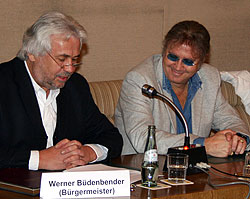 Dear Mr. Paice, I give you a warm welcome here in the townhall of
Wilnsdorf. We are very glad and proud to have a world star of rock
music in our town. Mr. Paice, it is said that Deep Purple have set
new standards for hard rock bands and much of the credit for that
achievement must be given to you, whose drum style became one of
the most influential in rock drumming. Countless drummers take you
as example. Dear Mr. Paice, my own first Deep Purple album was the
live album "Made In Japan" in 1972. That was the beginning of a
love relation in music which lasts until today. For this reason, I
am personally delighted to get the chance to meet one of the idols
of my youth. Mr. Paice, I have now the duty to mention that we,
you and me, are both born in the same year, namely in 1948 - it
was a good year.
Dear Mr. Paice, I give you a warm welcome here in the townhall of
Wilnsdorf. We are very glad and proud to have a world star of rock
music in our town. Mr. Paice, it is said that Deep Purple have set
new standards for hard rock bands and much of the credit for that
achievement must be given to you, whose drum style became one of
the most influential in rock drumming. Countless drummers take you
as example. Dear Mr. Paice, my own first Deep Purple album was the
live album "Made In Japan" in 1972. That was the beginning of a
love relation in music which lasts until today. For this reason, I
am personally delighted to get the chance to meet one of the idols
of my youth. Mr. Paice, I have now the duty to mention that we,
you and me, are both born in the same year, namely in 1948 - it
was a good year.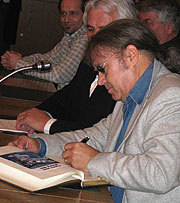
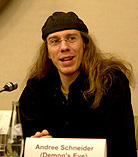 Andree
Schneider:
Andree
Schneider: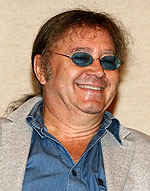 Ian
Paice:
Ian
Paice: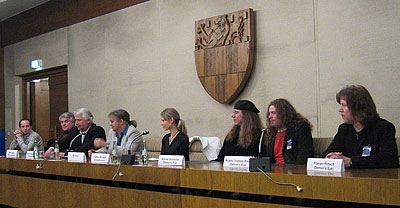 Ian Paice:
Ian Paice: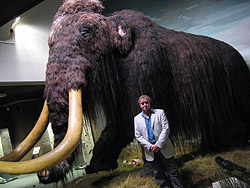 Ian Paice:
Ian Paice: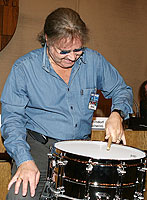 (aufmunternder Applaus)
(aufmunternder Applaus)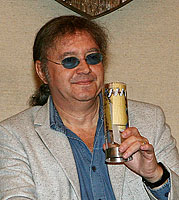 (Zum
Abschluss der Pressekonferenz bekommt Ian vom Bürgermeister
noch den sogenannten "Wilnsdorfer Willkomm`" geschenkt,
ein reichlich verziertes Bierglas der Gemeinde Wilnsdorf.)
(Zum
Abschluss der Pressekonferenz bekommt Ian vom Bürgermeister
noch den sogenannten "Wilnsdorfer Willkomm`" geschenkt,
ein reichlich verziertes Bierglas der Gemeinde Wilnsdorf.)